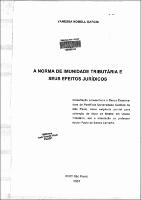Use este identificador para citar ou linkar para este item:
https://repositorio.pucsp.br/jspui/handle/handle/7869| Tipo: | Dissertação |
| Título: | A norma de imunidade tributária e seus efeitos jurídicos |
| Autor(es): | Garcia, Vanessa Nobell |
| Primeiro Orientador: | Carvalho, Paulo de Barros |
| Resumo: | As imunidades tributárias representam verdadeiras garantias constitucionais na medida em que visam a agasalhar determinados direitos fundamentais. Este trabalho tem por objetivo o estudo das normas de imunidade fiscal, bem como a análise de seus efeitos jurídicos. Partimos da linguagem do direito positivo, único meio de se ingressar no universo dos fenômenos jurídicos, para a compreensão dos preceitos imunitórios. Utilizaremos, para tanto, o material oferecido pela Semiótica, Lógica Jurídica e Teoria Geral do Direito. Num primeiro momento, firmaremos o paradigma a ser desenvolvido para que o destinatário desta mensagem possa precisar o terreno sobre o qual foi calcada a linha de raciocínio empreendida. Passaremos, então, para a delimitação semântica da expressão 'norma jurídica', bem como para a compreensão de sua estrutura lógica. Só assim estaremos aptos a enfrentar, ainda que incidentalmente, a questão da positivação do direito. O Capítulo 3 tem por fim a análise de todas as balizas impostas no momento do desenvolvimento da ação estatal de tributar. Nessa categoria de deveres estatais frente aos cidadãos, inserem-se os princípios constitucionais e os direitos e garantias fundamentais. Como as imunidades tributárias estão visceralmente atreladas à Teoria dos Valores, nada mais indicado do que a apreensão epistemológica dessa relação. Só então, ingressaremos na análise semântica da expressão 'imunidade tributária'. Nos Capítulos 5 e 6 trataremos dos efeitos jurídicos produzidos pelas normas de imunidade tributária no momento da produção de normas gerais e abstratas, e individuais e concretas, respectivamente. Abordaremos, também, as imunidades condicionais, finalizando o estudo com a análise epistêmica do direito subjetivo decorrente das normas de exclusão fiscal |
| Abstract: | Tax immunities are a true example of constitutionally protected privileges, while they were created with the intent of shielding certain fundamental rights. The intention behind this text is to study the rules that lie the foundation for tax immunities, as well as to analyze their legal effects. The starting point for this text is the Positive Law - in our view, the only way to enter the legal universe - as a means to understand the principles that guide the immunities. For such, we will make use of all material provided by Semiotics, by the Juridical Logic and by the General Theory of Law. We will first establish a model with the intent of furnishing the reader with any necessary understanding for determining the landfield over which the line the line of thought for the text was based on. We will, then, begin limiting semantically the expression "legal provision", as well as analyzing its logical structure. This way, we will finally be prepared to examine, even if incidentally, the issue of Positive Law. Throughout Chapter 3 we intend to examine the limits imposed at the moment the State creates its taxing. The constitutional principles and fundamental guarantees are part of this category of State duties before the citizens. It is algo important to understand, in an epistemological way, the relation between tax immunity and the Theory of Values, since they are so viscerally linked. After such analysis, we will be ready to enter into the semantic meaning of the expression 'tax immunity'. Chapters 5 and 6 will deal with the legal effects brought by the rules that allow tax immunity, with a view, at first, to the moment general and abstract rules are created, and then, focusing at the creation of individual and specific rules, respectively. Finally, we will comment on conditional immunity as well, finalizing the text with the epistemological analysis of the subjective right that arises from fiscal exclusion rules |
| Palavras-chave: | Direito tributario -- Brasil Imunidade tributaria Imunidade fiscal Direito |
| CNPq: | CNPQ::CIENCIAS SOCIAIS APLICADAS::DIREITO::DIREITO PUBLICO::DIREITO TRIBUTARIO |
| Idioma: | por |
| País: | BR |
| Editor: | Pontifícia Universidade Católica de São Paulo |
| Sigla da Instituição: | PUC-SP |
| metadata.dc.publisher.department: | Faculdade de Direito |
| metadata.dc.publisher.program: | Programa de Estudos Pós-Graduados em Direito |
| Citação: | Garcia, Vanessa Nobell. A norma de imunidade tributária e seus efeitos jurídicos. 2001. 387 f. Dissertação (Mestrado em Direito) - Pontifícia Universidade Católica de São Paulo, São Paulo, 2001. |
| Tipo de Acesso: | Acesso Restrito |
| URI: | https://tede2.pucsp.br/handle/handle/7869 |
| Data do documento: | 30-Dez-2001 |
| Aparece nas coleções: | Programa de Pós-Graduação em Direito |
Arquivos associados a este item:
| Arquivo | Descrição | Tamanho | Formato | |
|---|---|---|---|---|
| Vanessa Nobell Garcia.pdf Restricted Access | 13,53 MB | Adobe PDF |  Visualizar/Abrir |
Os itens no repositório estão protegidos por copyright, com todos os direitos reservados, salvo quando é indicado o contrário.
